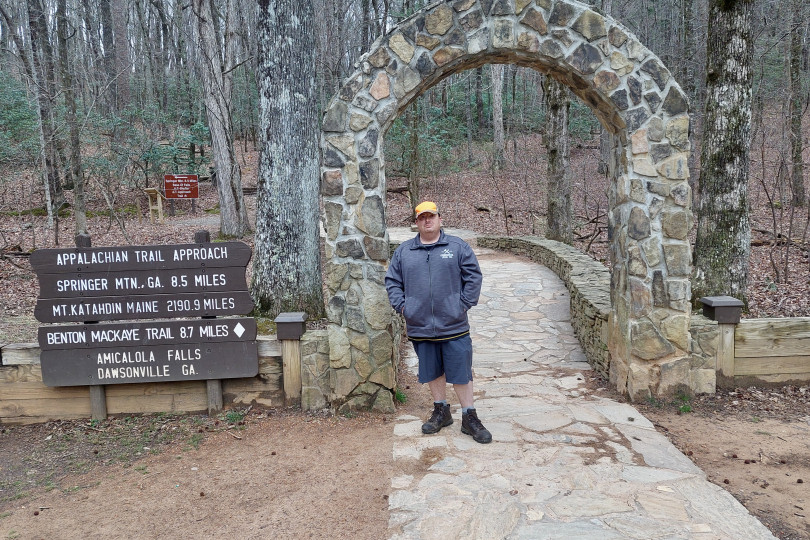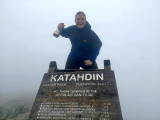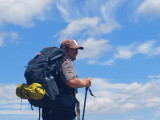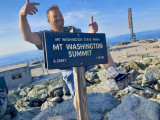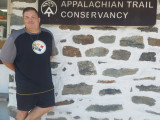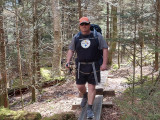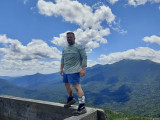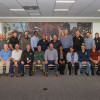“I had Boilermakers all over the East Coast who would message me to offer help, food, a ride. The outpouring of Boilermakers was so amazing, it shocked me.”
Brad Kohler gets ready on March 9 for his first steps onto the Appalachian Trail at the Springer Mountain, Georgia, trailhead.
View Photo Gallery (9 photos)
The average through-hike on the Appalachian Trail takes a little less than six months, according to the Appalachian Trail Conservancy. Hikers cover between 12-16 miles per day, and most begin at Springer Mountain, Georgia, and end in Katahdin, Maine. Over its 2,194.3 mile span, the trail wanders the mountain ridge through 14 states. It’s a grueling endeavor that tests even the most experienced hiker in both physical skill and mental endurance.
Each year, around 3,000 people attempt a through-hike on the trail.
Each year, around 75% of them quit. Local 154 (Pittsburgh) Boilermaker Brad “Guido” Kohler was not one of them. In 2022, he successfully completed the full once-in-a-lifetime through-hike on the infamous trail. And he might have missed the window of opportunity, but for his son, Beau, who shares a love of maps with his father.
“I have maps in my house of all kinds of trails, and I kept saying ‘One day, Daddy’s going to do the Appalachian Trail,’” Kohler recalls. Kohler had previously completed other long, challenging hikes, biking trails and canoe trails, but the Appalachian Trail was always on his mind.
When an early March layoff happened, Kohler weighed giving it a go. The layoff provided the right timeframe needed, but to start and finish the Appalachian ahead of winter storms in Maine, he’d need to be on the Georgia trailhead within the week. The clock was ticking. And he hadn’t done the intense pre-planning and training most AT hikers do. And, he says, he was out of shape—and not getting any younger.
Beau, then nine years old, didn’t let his dad off the hook.
“He says, ‘Dad, now’s the time for you to do it,’” Kohler says. So, with that nudge, plus encouragement from his fiancé, Jessica, he bought a new pack and gear; and within three days he was on his way to the Springer Mountain trailhead, stepping March 9 onto the “footpath for those who seek fellowship with the wilderness.”
Kohler finished the trail, averaging 18 miles per day, August 30, 2022.
Along the way, he gained some good stories and some great friends. His fiancé’s insistence that he affix bells to his backpack (to warn away wildlife) earned him the trail name “Jingles” early on. He eventually gave the bells to a son hiking with his blind father, so his father could have a better perspective of the trail. The trail name still stuck with Kohler.
He even set up a YouTube blog, “Hiking the AT with Guido” to chronicle the whole thing. Even the pain and uncertainty he endured.
At mile 1,687.3, Kohler fell from a hill. It was a bad fall. A Vermont hospital initially advised him that he’d broken a shoulder and an ankle.
“I thought it was over,” he says, “But then the surgeon said there was no break—it was just dislocated. He popped it back in, gave me an air cast and told me not to hike for several weeks.”
The news still didn’t sit well with Kohler.
“He’s a former Marine,” says L-154 Business Manager Mike Stanton. “And when he starts something, he finishes it. That’s just how he is.”
Kohler holed up at an area VFW for a few days, down in the dumps, feeling things out and wondering how and when he could tackle the rest of the trail. For a through-hike to “count,” the trail must be completed within a calendar year.
“A retired Marine there asked me what I was doing,” he says. “And he told me, ‘Either hike or go home.’ He kind of motivated me to try hiking the next day, which I did—just 10 miles, but I was able to do it.”
So, on he went.
“I never thought I wouldn’t make it through—mentally I always knew I was going got make it,” he says. “I knew I wasn’t quitting. I was a Marine—nothing was going to stop me if I could go.”
Kohler credits his time as an infantry field Marine and weekend hiking with preparing him for living in the dense Appalachian woods. He says he only saw three bears, who ran from him.
“The scariest thing happened sleeping in Pennsylvania—where I’m from,” he notes. At his camp one evening, he felt like something was under his tent. Sure enough, there was: A timber rattle snake.
“I got up and heard the rattle, so I flicked him a little, and he went off.”
But what sticks with Kohler the most is that despite the diversity of people on the trail—all races, religions, gender, politics, social economic status—hikers all got along, because everyone had the same singular goal: Make it to Maine.
“That was so amazing to me, and it reminded me of the Boilermakers,” he says. “We come from all different places, but when we get on the job, we all have one job. I loved that. No one fought, because we all had a common goal.”
He credits his fiancé and his Boilermaker family with the support that helped him make it to the end.
“Mike Stanton offered to help me out in so many ways,” he says. “I had Boilermakers all over the East Coast who would message me to offer help, food, a ride. The outpouring of Boilermakers was so amazing, it shocked me.”
He adds that his career as a Boilermaker affords him the time off he needs during layoffs to hit some great trails.
“It’s the best part-time job in the world,” he jokes.
Prior to completing the Appalachian, in 2012, Kohler and L-154 brother Steve Catty were two of the first 10 people to paddle the Northern Forest Canoe Trail in 2012—271 miles of waterway from New York to the top of Maine. And, in 2015, he and Catty tackled the daunting 740-mile Vermont Long Trail.
“I never wanted to do it again,” he says. “I think I needed a challenge, but it was so hard. I should have tried an easier trail.”
He’s also biked the Pittsburgh to Washington, D.C., Alleghany Pass every year for the past six years. He plans to take on the Denver to Durango Trail in Colorado in the future.
His advice for others debating a big hike (in addition to getting in shape): “Go do it. It’s the most freeing thing I’ve ever had in my life. On the trail, you only worry about food, water and shelter. It’s the most peaceful thing in the world.
“Do it immediately. Do not wait. I wish I’d done it earlier, because it was definitely life changing.”

